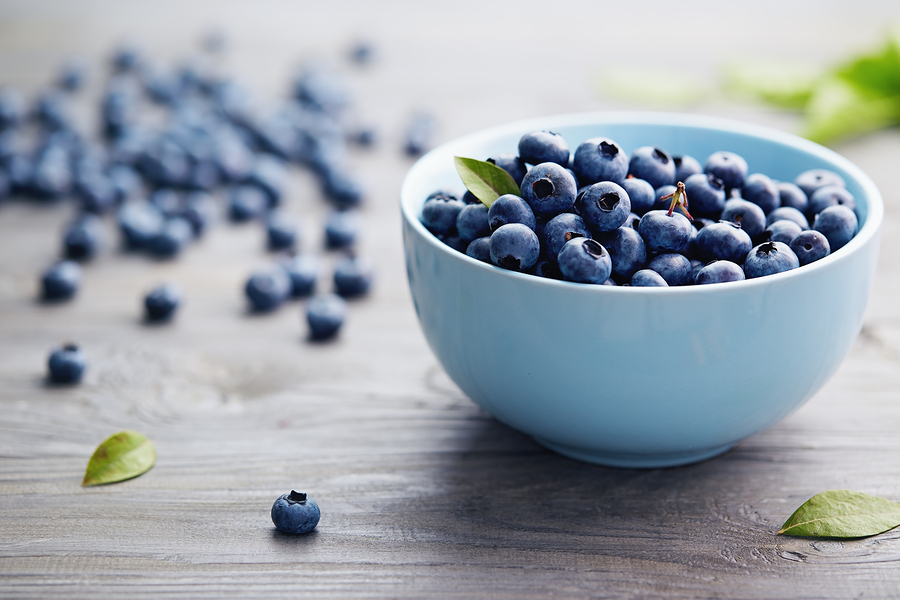The health benefits of blueberries are numerous but for this article we are going to concentrate on just six of them.
Blueberries are native to North America. With approximately 30 different species, blueberries have become an important and plentiful tool for preventing free radical damage, one of the leading causes of aging and degenerative diseases.
Because of its high ORAC value and nutritional density, I use frozen blueberries as one of my ingredients in my morning protein shake.
Here is a brief overview of the health benefits of blueberries:
Improves heart health
Provides cancer protection
Helps prevent damage to collagen
Improves cognitive function
Protects against macular degeneration and cataracts
Improves elimination
That’s an impressive list of health benefits all designed to keep you young and healthy as you age.
Health Benefits of Blueberries
Because of the high antioxidant properties of blueberries they are quickly becoming the North American version of the Brazilian Acai berry. Researchers at Tufts University recently analyzed 60 different fruits and vegetables. Blueberries rated the highest in their capacity to prevent free radical damage.
Blueberries belong to the heath family that includes the cranberry and bilberry, so some of the health benefits of blueberries are also found in these fruits.
Heart Health
There is a great deal of talk about the protective benefits of wine for cardiovascular health. A recent study in the Journal of Agriculture and Food Chemistry compared white wine, red wine and blueberry wine for their ability to deliver the cardio-protective benefits of anthocyanins, a powerful class of antioxidants. Using a moderate drink (about 4 ounces) as their testing sample, white wine delivered .47 mmol of this free radical absorbing antioxidant. Red wine delivered 2.04 mmol. And blueberry wine (made from high bush blueberries) delivered 2.42 mmol.
This would make sense since the darker the pigmentation of the fruit the greater its antioxidant capacity.
Cancer Protection
Blueberries seem to provide protection against both colon and ovarian cancer. In laboratory studies published by the Journal of Agricultural and Food Chemistry, the phenolic compounds extracted from blueberries were able to inhibit colon cancer cell proliferation. As well as induce apoptosis or programmed cell death.
The famous Nurses Health Study, which followed 66,940 women, revealed that those who have a diet rich in the flavoinoid kaempferol had a 40% reduction in the risk for ovarian cancer. Blueberries, non herbal tea, onions, curly kale, leeks, broccoli and spinach are all good sources of kaempferol.
Prevent Collagen Damage
Blueberries are ideal in helping to prevent damage to your collagen. Collagen is your body’s main protein making up 25 – 35% of your total protein content. It is the main component of fascia, cartilage, ligaments, tendons, bone and skin. It strengthens blood vessels and is present in the eye.
The powerful antioxidants called anthocyanins help to neutralize free radical damage to the collagen matrix of cells and tissues. Because the blue-red pigments of blueberries are rich in anthocyanins they help provide protection against cataracts, varicose veins, arteriosclerosis, premature aging of the skin, heart disease, and cancer.
Cognitive Function
Researchers have found that blueberries help to protect the brain of aging animals from oxidative stress. This significantly improves both their learning capacity and motor skills. Although animal studies do not always correlate with humans, at least you can share you blueberries with your favorite pet and one of you will remember were you left your keys.
Eye Health
A study of 110,000 men and women, published in the Archives of Ophthalmology, indicates that eating 3 or more servings of fruit per day may lower the risk of macular degeneration by 36% when compared to those who consumed less than 1.5 servings of fruit per day. Bilberry, the British cousin to the blueberry, has long been shown to improve nighttime visual acuity.
Improves Elimination
The health benefits of blueberries also extend to elimination. Blueberries are a good source of both soluble and insoluble fiber. The insoluble fiber will add bulk to the stools. The soluble fiber will absorb bile helping the body to naturally lower its cholesterol levels.
Blueberries contain tannins which act as astringents in the digestive system to reduce inflammation. Blueberries also contain the same compounds found in cranberries. These compounds help to prevent or eliminate urinary tract infections by reducing the ability of E. coli to adhere to the mucosal lining of the urethra and bladder.
Conclusion for the Health Benefits of Blueberries
As you can see blueberries have tremendous health benefits. They are rich in vitamins A, C, E and beta-carotene. They are an excellent source of potassium, manganese, and magnesium. They are high in fiber and low in saturated fat, cholesterol and sodium. And they provide a wide variation of protective antioxidants to help prevent degenerative diseases.
The only negative to blueberries is that they are a source of oxalates. Oxalates should not be eaten in high concentration as they can crystallize to cause kidney and gallbladder problems. However, with a high ORAC value, a small amount can be consumed on a daily basis to provide you with the antioxidants needed to protect you from free radical damage.
One final note regarding the anthocyanins found in blueberries. According to a study from the Journal of Agricultural and Food Chemistry, anthocyanins from berries are almost undetectable in canned foods, bread, cereals and baby foods because of how they are processed. This means that if you want to enjoy all the health benefits of blueberries, then fresh and frozen berries are best.
